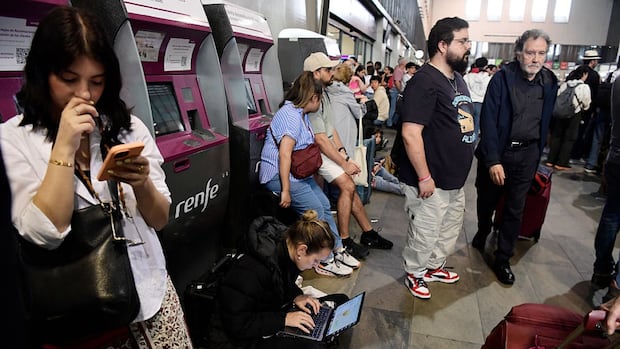Electricity was restored to almost all of Spain and Portugal on Tuesday morning following a massive power cut affecting the entire Iberian Peninsula, but the cause of the blackouts remained a mystery.
The widespread outage lasted roughly eight hours — in some regions longer — and shut down subway networks, ATMs and traffic lights, while disrupting flights and mobile communications on Monday.
By 7 a.m. local time on Tuesday, more than 99 per cent of energy demand in Spain had been restored, the country’s electricity operator Red Electrica said. Portuguese grid operator REN said all of its power substations were back online.
As life began to return to normal — with schools and offices reopening, traffic easing and public transport restarting — authorities in Spain have yet to provide further explanations for what caused one of the most serious blackouts to ever take place in Europe.

Spanish Prime Minister Pedro Sanchez said his government’s priorities were twofold: restoring the country’s electrical system and finding the causes of the blackout, so that a similar event “never takes place again.”
“We are analyzing all the potential causes without discarding any hypothesis,” Sanchez said.
Such widespread electrical failure has little precedent on the Iberian Peninsula or in Europe.
People were left stranded outside Madrid train stations on Monday as a sweeping power outage snarled public transport, delayed flights and caused widespread traffic jams.
Eduardo Prieto, director of services for system operations at Spain’s electricity operator, noted two steep, back-to-back “disconnection events” before Monday’s blackout. Speaking at a news conference on Tuesday, he said more investigation was needed to understand why they took place.
Red Electrica, in a statement on Monday night, pointed to a “strong oscillation in the power flow,” which triggered “a very significant loss of generation.”

A source with direct knowledge of the sector said that at the time of the outage, the Spanish grid was running with very little “inertia,” which is the energy moving in a large, rotating mass like a generator or in some industrial motors.
Inertia helps to stabilize the grid by slowing down the rate of frequency change when there’s a sudden drop or rise in demand or generation.
“In those conditions [when there is little inertia] if there’s a drop in production for whatever reason, the grid loses [more] inertia and everything fails. And in a blackout, you need to rebuild inertia before bringing things back online, which takes a few hours,” the source said, requesting anonymity.
No unusual weather event or sign of cyberattack
Spain’s meteorological agency, AEMET, said that it had not detected any “unusual meteorological or atmospheric phenomena” on Monday, and no sudden temperature fluctuations were recorded at their weather stations.
Portugal’s National Cybersecurity Centre on Monday dismissed speculation about foul play, saying there was no sign that the outage resulted from a cyberattack.
European Council President Antonio Costa also said there were “no indications of any cyberattack.” Teresa Ribera, an executive vice-president of the European Commission, ruled out sabotage but emphasized the outage “is one of the most serious episodes recorded in Europe in recent times.”
While Red Electrica also ruled out a cyberattack, Spain’s High Court said it would open an investigation to determine whether an “an act of computer sabotage” could have been committed “against critical Spanish infrastructure.”
‘Electrical instability’ affecting Barcelona’s metro
Power has been restored at the Caja Mágica tennis complex and the Madrid Open resumed on Tuesday with a packed schedule, following a day in which 22 matches had to be postponed.
At Spain’s largest train stations, droves of travellers waited Tuesday morning to board trains or rebook tickets for journeys that were cancelled or disrupted.
At Madrid’s Atocha station, hundreds of people stood near screens waiting for updates. Many had spent the night at the station, wrapped in blankets provided by the Red Cross. Similar scenes played out at Barcelona’s Sants station.
By 11 a.m. local time Tuesday, service on Madrid’s subway system was fully restored. In Barcelona, the system was operating normally, but commuter trains were suspended due to “electrical instability,” the company that runs the service, Rodalies Catalunya, said on X.
Emergency workers in Spain said they had rescued some 35,000 passengers on Monday stranded along railways and underground, with the blackout turning sports centres, train stations and airports into makeshift overnight refuges.

Meanwhile, thousands of kilometres away, remote areas of Greenland were cut off from crucial satellite access due to the power outage across the Iberian Peninsula — but the Greenlandic telecom company Tusass said on Tuesday that service was restored overnight.
Tusass said on Monday that it had lost connection to satellite equipment based in Spain that provides telephone, internet, TV and radio services.

